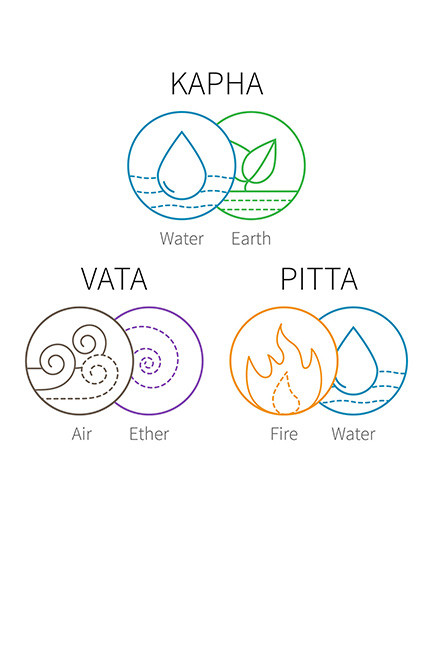Ayurvedic Lifestyle Changes To Manage Vata Dosha Imbalance
The ancient Indian medical method known as Ayurveda has been practiced for many years. Its foundation is the idea that maintaining physical, mental, and spiritual wellness requires careful balancing of all three. Ayurveda recognizes three doshas – Vata dosha, Pitta, and Kapha – which are the primary energies that govern the body’s functions.
Vata dosha is responsible for movement, communication, and creativity in the body. It governs bodily functions such as breathing, circulation, and nervous system activity. Vata is considered the most delicate of the three doshas and is easily imbalanced, leading to various physical and mental health issues.
Balancing Vata dosha is crucial for overall health and well-being. When Vata is in balance, it promotes creativity, mental clarity, and flexibility. However, when Vata is imbalanced, it can lead to physical and mental health issues such as anxiety, insomnia, and digestive problems.
The impact of Vata imbalance on the body and mind can be significant. Physically, imbalanced Vata dosha can cause dryness, constipation, joint pain, and muscle weakness. Mentally, Vata imbalance can cause restlessness, anxiety, fear, and difficulty focusing.
Therefore, it is essential to balance Vata dosha to maintain optimal health and well-being. Ayurveda offers various treatments, lifestyle changes, and practices to balance Vata dosha and promote positive mental health.
Diet And Nutrition For Vata Dosha Imbalance

Ayurveda emphasizes the importance of a balanced diet to maintain optimal health and well-being. For those with Vata dosha imbalance, a Vata-pacifying diet can be particularly beneficial in restoring balance and promoting positive health outcomes.
The Vata-pacifying diet is warming, grounding, and nourishing. It emphasizes the consumption of warm, cooked, and easily digestible foods to balance Vata dosha. Here are some guidelines for a Vata-pacifying diet:
Foods to Avoid:
- Cold or raw foods
- Dry or light foods such as crackers and popcorn
- Stimulating or spicy foods such as chili peppers and caffeine
- Carbonated drinks and alcohol
Foods to Incorporate:
- Warm, cooked foods
- Nourishing soups and stews
- Sweet and juicy fruits such as bananas, peaches, and mangoes
- Healthy fats such as ghee, sesame oil, and avocado
- Soothing and grounding spices such as cumin, ginger, and cinnamon
- In addition to food choices, Ayurveda emphasizes the importance of digestion-enhancing practices to support optimal digestion and absorption of nutrients.
Here are some practices to promote healthy digestion:
- Eat meals at regular times to support a healthy circadian rhythm
- Eat in a calm and peaceful environment to support the relaxation response
- Chew food thoroughly to aid in digestion
- Avoid eating too much because this can cause indigestion and other digestive problems.
- Take a walk after meals to support digestion and enhance metabolism
Exercise And Movement For Vata Dosha Imbalance
In Ayurveda, exercise and movement are considered essential for balancing Vata dosha and promoting overall health and well-being. However, it is important to choose the right type of exercise to avoid aggravating Vata dosha further. Here are some guidelines for choosing the best types of exercise for Vata dosha imbalance:
- Low-impact exercises such as walking, swimming, and cycling are best for Vata.
- Avoid high-impact exercises such as running or jumping, which can increase Vata.
- Incorporate gentle exercises such as yoga, tai chi, or qigong to balance Vata.
Regular exercise is crucial for maintaining optimal health and promoting balance in the body and mind. Exercise helps to increase circulation, enhance digestion, and improve overall physical and mental health. Additionally, exercise can help to reduce stress and anxiety, which can exacerbate Vata dosha imbalances.
Incorporating yoga and meditation into your daily routine is especially beneficial for balancing Vata dosha. Yoga and meditation are gentle, low-impact exercises that help to reduce stress, enhance relaxation, and promote mental clarity. Specific yoga postures, such as grounding poses like the mountain pose and the warrior pose, can be particularly beneficial for balancing Vata.
Ayurvedic Self-Care Practices For Vata Dosha Imbalance
Self-care is an important aspect of ayurvedic medicine for vata dosha and can be particularly helpful for balancing Vata imbalances. Here are some Ayurvedic self-care practices that can help to balance Vata dosha:
- Self-massage: Self-massage, or abhyanga, is a practice that involves massaging the body with warm oil to promote relaxation, improve circulation, and balance Vata. For Vata dosha imbalances, it is recommended to use warm sesame oil or a Vata-pacifying oil such as almond or jojoba oil.
- Oil treatments: In addition to self-massage, oil treatments such as shirodhara and basti can be particularly helpful for balancing Vata. Shirodhara involves pouring warm oil over the forehead, which can help to calm the mind and promote relaxation. Basti involves administering warm oil enemas, which can help to nourish the colon and balance Vata dosha.
- Warm baths: Taking warm baths with Epsom salts or Vata-pacifying herbs such as ginger or lavender can help to relax the body, calm the mind, and balance Vata dosha.
- Aromatherapy: Essential oils such as lavender, chamomile, and sandalwood can be used in aromatherapy to promote relaxation, reduce stress, and balance Vata dosha.
- Mindfulness practices: Mindfulness practices such as meditation, deep breathing, and gentle yoga can be particularly helpful for balancing Vata dosha and reducing stress and anxiety.
- Regular sleep routine: Establishing a regular sleep routine and getting adequate sleep can help to balance Vata . It is recommended to go to bed and wake up at the same time each day, avoid stimulating activities before bed, and create a relaxing bedtime routine.
Daily Routine For Vata Dosha Imbalance
Establishing a daily routine, or dinacharya, is an important aspect of ayurvedic medicine for vata dosha and can be particularly helpful for balancing Vata imbalances. Here are some Ayurvedic practices that can be incorporated into a daily routine to balance Vata dosha:
- Wake up early: It is recommended to wake up before 6 a.m. in the morning to align with the natural rhythms of the body and promote balance of Vata.
- Tongue scraping: Tongue scraping is a practice that involves scraping the tongue with a tongue scraper to remove toxins and promote oral hygiene. This practice should be done before brushing the teeth.
- Warm water: Drinking a glass of warm water with lemon or ginger in the morning can help to stimulate digestion, promote detoxification, and balance Vata.
- Exercise: Incorporating gentle movement or exercise such as yoga, tai chi, or walking can help to promote circulation, reduce stress, and balance Vata.
- Regular meal times: Eating meals at regular times each day can help to promote digestion and balance Vata. It is recommended to have a nourishing breakfast, a light lunch, and an early dinner.
- Relaxation: Incorporating relaxation practices such as meditation, deep breathing, or gentle stretching in the evening can help to promote relaxation, reduce stress, and balance Vata.
- Early bedtime: It is recommended to go to bed by 10 p.m. to ensure adequate rest and promote balance of Vata.
Conclusion
In conclusion, balancing Vata is crucial for overall health and well-being in ayurvedic medicine for vata dosha. Lifestyle changes, including diet and nutrition, exercise and movement, daily routines, and self-care practices, can help to manage Vata imbalance.
Incorporating a Vata-pacifying diet, gentle exercise, and a consistent daily routine can promote Vata dosha balance. Additionally, self-care practices such as self-massage and oil treatments can help to calm the mind and reduce stress.
It is essential to incorporate these Ayurvedic practices into daily routines for long-term benefits. By balancing Vata, individuals can experience improved mental and physical health, including reduced stress, anxiety, and insomnia.







